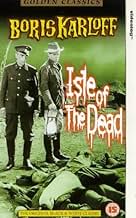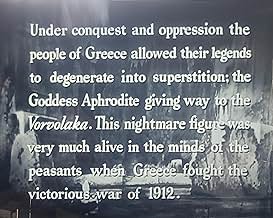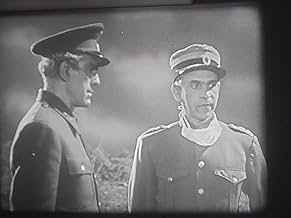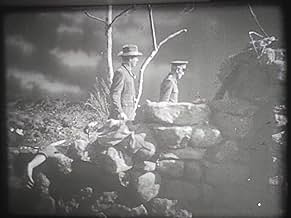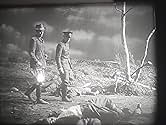IMDb RATING
6.5/10
5.6K
YOUR RATING
A Greek general takes leave from the 1912 Balkan War to visit a small island in Greece, where his wife is buried. A plague soon breaks out and he is forced to stay when quarantine is declare... Read allA Greek general takes leave from the 1912 Balkan War to visit a small island in Greece, where his wife is buried. A plague soon breaks out and he is forced to stay when quarantine is declared.A Greek general takes leave from the 1912 Balkan War to visit a small island in Greece, where his wife is buried. A plague soon breaks out and he is forced to stay when quarantine is declared.
- Awards
- 2 nominations total
Jason Robards Sr.
- Albrecht
- (as Jason Robards)
Ernst Deutsch
- Dr. Drossos
- (as Ernst Dorian)
Sherry Hall
- Col. Kobestes
- (uncredited)
Erick Hanson
- Officer
- (uncredited)
Rose Hobart
- Mrs. Mary St. Aubyn (in long shot)
- (uncredited)
Skelton Knaggs
- Andrew Robbins
- (uncredited)
- Director
- Writers
- All cast & crew
- Production, box office & more at IMDbPro
Featured reviews
... probably not even for 1945.
Gen. Nikolas Pherides (Boris Karloff) has just successfully beat back invading troops in 1912 Greece. He is conversing with American war correspondent Oliver Davis about his philosophy of war, when Davis says he is going over to the small island near the battlefield to look around. The general mentions his wife is buried there and says that he will go over with him to visit her grave. When they get there they find the grave has been robbed.
They come across the home of retired Swiss archeologist Dr. Aubrecht (Jason Robards, Sr.), his Greek housekeeper Madame Kyra, British diplomat Mr. St. Aubyn (Alan Napier) and his pale and sickly wife, her youthful Greek companion Thea, and English tinsmith Andrew Robbins. Aubrecht explains that the graves were robbed by locals years ago, searching for antiquities. The general and Davis spend the night there, but the next morning the tinsmith is found dead of the plague. This means they must all stay on the island until the winds change and the disease - always fatal -runs its course among them.
What follows is a psychological thriller that gets a bit too chatty and claustrophobic for my taste, but it has its good points. The main focus is the general, and how his desire to protect through strict control, which works well in the aggregate when he is commanding troops, turns malignant and to madness when his normally logical mind is peppered with thoughts of a vorvolaka - a type of vampire - by the superstitious and rather malicious servant Madame Kyra. Kyra insinuates Thea is the vorvolaka and that she's the reason that Mrs. St. Aubyn's health is slowly fading. The general's imagination does the rest.
Gen. Nikolas Pherides (Boris Karloff) has just successfully beat back invading troops in 1912 Greece. He is conversing with American war correspondent Oliver Davis about his philosophy of war, when Davis says he is going over to the small island near the battlefield to look around. The general mentions his wife is buried there and says that he will go over with him to visit her grave. When they get there they find the grave has been robbed.
They come across the home of retired Swiss archeologist Dr. Aubrecht (Jason Robards, Sr.), his Greek housekeeper Madame Kyra, British diplomat Mr. St. Aubyn (Alan Napier) and his pale and sickly wife, her youthful Greek companion Thea, and English tinsmith Andrew Robbins. Aubrecht explains that the graves were robbed by locals years ago, searching for antiquities. The general and Davis spend the night there, but the next morning the tinsmith is found dead of the plague. This means they must all stay on the island until the winds change and the disease - always fatal -runs its course among them.
What follows is a psychological thriller that gets a bit too chatty and claustrophobic for my taste, but it has its good points. The main focus is the general, and how his desire to protect through strict control, which works well in the aggregate when he is commanding troops, turns malignant and to madness when his normally logical mind is peppered with thoughts of a vorvolaka - a type of vampire - by the superstitious and rather malicious servant Madame Kyra. Kyra insinuates Thea is the vorvolaka and that she's the reason that Mrs. St. Aubyn's health is slowly fading. The general's imagination does the rest.
In 1912, a stern old Greek general finds himself trapped on the ISLE OF THE DEAD after an outbreak of the dreaded plague.
When the front office at RKO Pictures informed producer Val Lewton that Boris Karloff had been procured to appear in his next suspense film, he wasn't entirely pleased. Karloff was famous for his portrayal of horrific monsters & mummies, sensationalist creations not at all in tune with the psychological thrillers for which Lewton was noted -- with very low budgets, he was able to fashion fascinating films in which the atmosphere was every bit as important as the plot.
Luckily, Karloff turned out to be an inspired choice. Determined to show that he was a skilled actor (actually, he was a very fine & talented performer) he was completely in sync with what Lewton envisaged, giving a nuanced portrayal of an essentially decent man who finds himself slowly driven to a sort of despair by the forces around him. He becomes the heart of a film which wisely saves its shocks for the last few minutes, having built up to the eerie climax slowly & inexorably.
Lewton was very pleased with Karloff's work and arranged two more collaborations. With only two weeks left in filming ISLE OF THE DEAD, Karloff had to be hospitalized for serious back problems. On his release from hospital, he found Lewton was all prepared to film THE BODY SNATCHER (1945). Karloff gave another wonderful performance, before finally finishing ISLE OF THE DEAD. The following year Karloff starred in Lewton's BEDLAM (1946), completing the trio of very tidy thrillers.
Karloff's co-stars give him good support, especially Ernst Deutsch as a military doctor; Alan Napier & Katherine Emery as a British consul and his invalid wife; Helen Thimig as a superstitious Greek peasant; and little Skelton Knaggs, who in a tiny scene with only a few words is able to make his Cockney tinker character come alive.
Ellen Drew & Marc Cramer handle the romance, which fortunately does not intrude too much on the story.
The viewer, in the course of watching ISLE OF THE DEAD, will discover much about the medical state of catatonia, as well as the monstrous vorvolaka, part vampire - part werewolf, which haunts Greek nightmares.
Lewton based his ideas for this film on a painting he had seen as a boy in Russia, Arnold Böcklin's darkly allegorical Island of the Dead (1880), which is shown behind the opening credits of the film. This somewhat sinister painting was also the inspiration for Sergey Rachmaninoff's celebrated symphonic poem, The Isle of the Dead' (1909).
Incidentally, the conflict which is the background to the film was the Balkan War of 1912, in which the Balkan League (Greece, Serbia, Bulgaria & Montenegro) attacked the Ottoman Empire and destroyed most of its hegemony on the European continent. Begun in October and ended in December, it was short & bloody. However, troubles in Constantinople started hostilities up again in January of 1913. It finally ended in May, with the Turks once more decisively defeated. Although the Empire was left very much weakened, the War solved very little else. In June, the victorious parties began fighting amongst themselves, with Greece & Serbia trouncing Bulgaria by August. Greece ended the two short Wars with Crete and parts of Macedonia & Epirus added to her territories and the new state of Albania was carved out of old Ottoman lands. But ancient animosities were aroused and the entire Peninsula lay waiting for the next international incident, which obligingly took place 10 months later at the Bosnian capital of Sarajevo.
When the front office at RKO Pictures informed producer Val Lewton that Boris Karloff had been procured to appear in his next suspense film, he wasn't entirely pleased. Karloff was famous for his portrayal of horrific monsters & mummies, sensationalist creations not at all in tune with the psychological thrillers for which Lewton was noted -- with very low budgets, he was able to fashion fascinating films in which the atmosphere was every bit as important as the plot.
Luckily, Karloff turned out to be an inspired choice. Determined to show that he was a skilled actor (actually, he was a very fine & talented performer) he was completely in sync with what Lewton envisaged, giving a nuanced portrayal of an essentially decent man who finds himself slowly driven to a sort of despair by the forces around him. He becomes the heart of a film which wisely saves its shocks for the last few minutes, having built up to the eerie climax slowly & inexorably.
Lewton was very pleased with Karloff's work and arranged two more collaborations. With only two weeks left in filming ISLE OF THE DEAD, Karloff had to be hospitalized for serious back problems. On his release from hospital, he found Lewton was all prepared to film THE BODY SNATCHER (1945). Karloff gave another wonderful performance, before finally finishing ISLE OF THE DEAD. The following year Karloff starred in Lewton's BEDLAM (1946), completing the trio of very tidy thrillers.
Karloff's co-stars give him good support, especially Ernst Deutsch as a military doctor; Alan Napier & Katherine Emery as a British consul and his invalid wife; Helen Thimig as a superstitious Greek peasant; and little Skelton Knaggs, who in a tiny scene with only a few words is able to make his Cockney tinker character come alive.
Ellen Drew & Marc Cramer handle the romance, which fortunately does not intrude too much on the story.
The viewer, in the course of watching ISLE OF THE DEAD, will discover much about the medical state of catatonia, as well as the monstrous vorvolaka, part vampire - part werewolf, which haunts Greek nightmares.
Lewton based his ideas for this film on a painting he had seen as a boy in Russia, Arnold Böcklin's darkly allegorical Island of the Dead (1880), which is shown behind the opening credits of the film. This somewhat sinister painting was also the inspiration for Sergey Rachmaninoff's celebrated symphonic poem, The Isle of the Dead' (1909).
Incidentally, the conflict which is the background to the film was the Balkan War of 1912, in which the Balkan League (Greece, Serbia, Bulgaria & Montenegro) attacked the Ottoman Empire and destroyed most of its hegemony on the European continent. Begun in October and ended in December, it was short & bloody. However, troubles in Constantinople started hostilities up again in January of 1913. It finally ended in May, with the Turks once more decisively defeated. Although the Empire was left very much weakened, the War solved very little else. In June, the victorious parties began fighting amongst themselves, with Greece & Serbia trouncing Bulgaria by August. Greece ended the two short Wars with Crete and parts of Macedonia & Epirus added to her territories and the new state of Albania was carved out of old Ottoman lands. But ancient animosities were aroused and the entire Peninsula lay waiting for the next international incident, which obligingly took place 10 months later at the Bosnian capital of Sarajevo.
BORIS KARLOFF is a Greek general whose wife's body has mysteriously vanished from its tomb at the start of ISLE OF THE DEAD. He's naturally suspicious that something more evil than the plague has crept over the island he decides must be quarantined--forbidding anyone from leaving it. ELLEN DREW is a young woman he suspects may have something to do with evil spirits--or even vampirism--and MARC CRAMER is a young soldier who wants to protect her.
All the ingredients for a good chiller are here, but it's a story that gets its main strength, not from the plot, but from the sinister, shadowy B&W photography that sets up the moody atmosphere from the start, with an air of dread lingering over every scene.
Aiding considerably are strong performances from KATHERINE EMERY as a sick woman who fears being buried alive, and HELEN THIMIG as a superstitious old woman. In fact, all of the supporting players do well under Mark Robson's taut direction.
The tale itself is not one of my favorites but it's a credit to all concerned that they do a job of giving it a creepiness that should satisfy even the most jaded of Gothic horror fans.
And yet, ultimately, there's a bit of a letdown as far as the story itself is concerned. The ingredients are all there, but something vital is missing and I'm sorry to say I don't know exactly what it is.
Nevertheless, holds the interest throughout.
All the ingredients for a good chiller are here, but it's a story that gets its main strength, not from the plot, but from the sinister, shadowy B&W photography that sets up the moody atmosphere from the start, with an air of dread lingering over every scene.
Aiding considerably are strong performances from KATHERINE EMERY as a sick woman who fears being buried alive, and HELEN THIMIG as a superstitious old woman. In fact, all of the supporting players do well under Mark Robson's taut direction.
The tale itself is not one of my favorites but it's a credit to all concerned that they do a job of giving it a creepiness that should satisfy even the most jaded of Gothic horror fans.
And yet, ultimately, there's a bit of a letdown as far as the story itself is concerned. The ingredients are all there, but something vital is missing and I'm sorry to say I don't know exactly what it is.
Nevertheless, holds the interest throughout.
I'm still not quite sure what I saw in Isle of the Dead. I do know it succeeded in giving me the willies.
Several people gather on Greek Island during the Balkan Wars when a type of plague strikes and folks die one by one. One old peasant woman, Helene Thimig suspects young and pretty Ellen Drew of being a monster called a Vorvola which was part of the old Greek religion of Zeus and the rest of the folks from Olympus. The problem is that she gets old Greek general Boris Karloff, a brooding and suspicious man to start with, believing it as well.
Imagine Agatha Christie's And Then There Were None laced with the atmosphere of a horror film and you've got Isle of the Dead. At the end of the film you're not even sure what's happened, but the mood created in you by producer Val Lewton will linger on.
I'm not sure what a guy like Val Lewton would have done with a big budget in a studio like MGM or Paramount. Those recycled RKO sets with the proper sinister lighting were a signature with him.
So was there a Vorvola? Watch and judge for yourself.
Several people gather on Greek Island during the Balkan Wars when a type of plague strikes and folks die one by one. One old peasant woman, Helene Thimig suspects young and pretty Ellen Drew of being a monster called a Vorvola which was part of the old Greek religion of Zeus and the rest of the folks from Olympus. The problem is that she gets old Greek general Boris Karloff, a brooding and suspicious man to start with, believing it as well.
Imagine Agatha Christie's And Then There Were None laced with the atmosphere of a horror film and you've got Isle of the Dead. At the end of the film you're not even sure what's happened, but the mood created in you by producer Val Lewton will linger on.
I'm not sure what a guy like Val Lewton would have done with a big budget in a studio like MGM or Paramount. Those recycled RKO sets with the proper sinister lighting were a signature with him.
So was there a Vorvola? Watch and judge for yourself.
Wonderfully atmospheric film with a unique sense of place and well-drawn characters. Karloff's performance here is excellent, yet very different from his work in other films. You may be disappointed if you go in expecting something like his horror classics for Universal. This one is suggestive rather than shocking, and I'd recommend it to anyone who likes the subtle horrors of Cat People, The Innocents, or even Rosemary's Baby. Because of its literate script and interesting character development, Isle of the Dead may also appeal to others who don't usually like horror.
Did you know
- TriviaRose Hobart was cast in the film, but Boris Karloff became ill and the production had to be shut down until he recovered. By the time he returned, she was working on another film and was replaced. However, Hobart said in a 1984 interview that she can still recognize herself in long shots.
- GoofsAlbrecht refers to Hermes as the god of medicine. In Greek mythology, Asclepius was the god of medicine. In terms of medical support, Hermes' assistance was sought by runners or any athletes with injuries.
- Crazy creditsIntro: "Under conquest and oppression the people of Greece allowed their legends to degenerate into superstition; the Goddess Aphrodite giving way to the Vorvolaka. This nightmare figure was very much alive in the minds of the peasants when Greece fought the victorious war of 1912."
Details
Box office
- Budget
- $246,000 (estimated)
- Runtime1 hour 11 minutes
- Color
- Aspect ratio
- 1.37 : 1
Contribute to this page
Suggest an edit or add missing content






